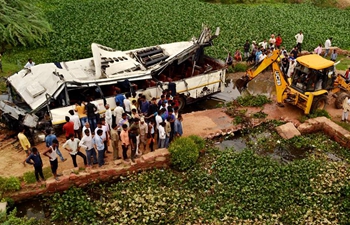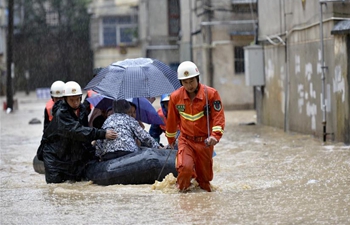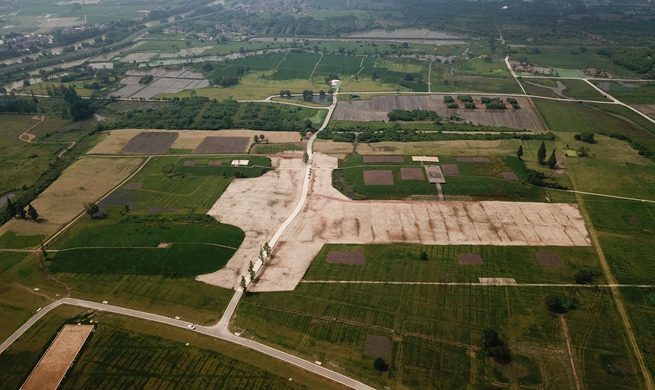TOKYO, July 8 (Xinhua) -- In Japan, which boasts the world's strictest standards of garbage classification, waste sorting and recycling has been practiced for many years and has become a basic survival skill for the Japanese people.
The practice of garbage classification and recycling in various parts of Japan are largely similar: there is a fixed time for disposal of each kind of garbage; disposal of large waste items needs to be reserved and paid; and littering can result in high fines and even jail time with Japan's severe punishment rules.
Taking the Shibuya Ward of Tokyo as an example, to distinguish the classification of garbage, people first need to refer to the garbage classification chart. Besides the Japanese version, Chinese, English and South Korean versions are also available at the ward governmental office and on government website.
Household garbage is basically divided into combustible, non-combustible, resources and large garbage items. After getting familiar with these categories, it is the most practical way to figure out what are non-combustible, resources and large items, and almost everything else can be classified as combustible garbage.
Non-combustible garbage, which is not suitable for incineration and crushing, includes metal, glass, ceramics, dry batteries and small appliances like hair dryers. As non-combustible garbage is not often found, its recycling frequency is very low, usually once a month.
Resource waste, including plastic bottles, newspapers, magazines and cartons, is usually collected once a week. According to the latest classification method, waste lamps containing mercury are also classified as resource.
Instead of mixing the resource waste together, it is vital to clean, sort out and bag all kinds of resource waste. More specifically, plastic bottle caps and wrapping paper are usually removed and need to be classified as combustible waste, leaving the body of the bottle for recycling. It is also suggested to wash the bottles so that the residue of drinks or milk will not produce an unpleasant smell, which is considered as a thoughtful move for the recycling staff.
Disposal of large garbage, mainly furniture longer than 30 cm, need to be reserved and paid in Japan. For example, a single sofa costs 800 yen (7.37 U.S. dollars) and a double sofa 2,000 yen (18.42 dollars). According to the Shibuya government website, it costs 2,484 yen (22.88 dollars) to throw away a washing machine.
In Japan, littering is called "illegal dumping" and carries a penalty of up to five years or a fine of up to 10 million yen (92,100 dollars). Companies can be fined up to 100 million yen (921,000 dollars) for illegally dumping industrial waste.
In daily life, combustible garbage is the most common, including kitchen waste that is drained, paper, old clothes, branches and leaves and so on. Basically, garbage that can be burned is classified as combustible garbage, which is typically recycled twice a week in transparent or light-colored bags.
Although some of the combustible waste is plastic, rubber or leather, such as leather shoes and bags, it is difficult to recycle them like plastic bottles and they also end up in nearby incinerators in the city. For example, there are 21 waste incineration plants in the 23 wards of Tokyo.
In Japan, people pile rubbish in bags outside their home for trucks to collect along the street, so in most cases, there are no rubbish bins in front of houses. To prevent crows from pecking the food residue, blue nets are used to cover the rubbish but sometimes crows still manage to scatter garbage in the street.
If the garbage collector finds an unreasonable classification or a wrong disposal time, he or she can refuse to collect it, and post a note of classification methods to remind householders to properly classify the garbage.
In Japan, people consider it a disgrace when garbage disposal is rejected due to improper sorting. In serious "illegal dumping" cases, police may even get involved.













